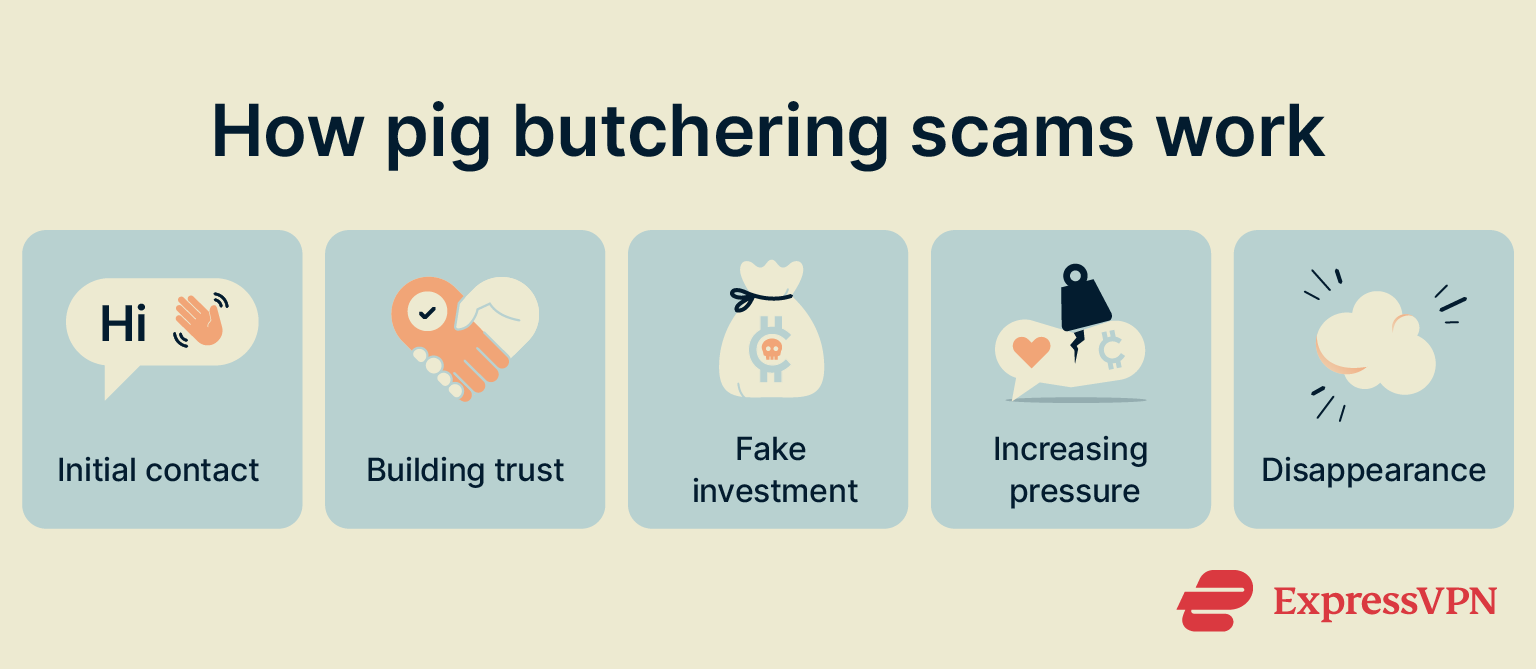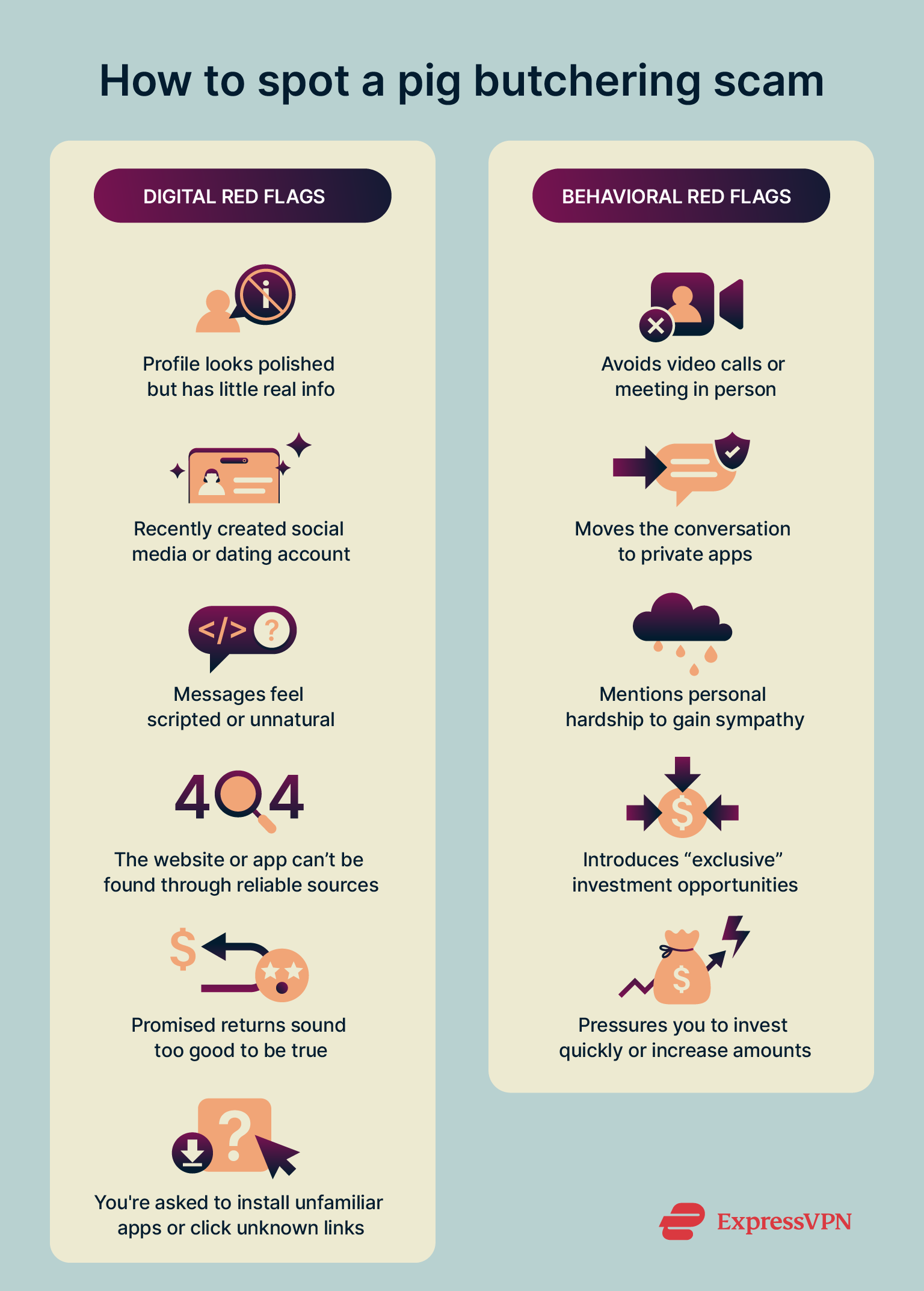Don’t fall for a pig butchering scam: Recognize the red flags

You’ve probably heard the saying “If it sounds too good to be true, it probably is.” But scammers have gotten really good at making it sound just believable enough.
One of the most devious tricks out there is called pig butchering. It’s a long game where fraudsters carefully earn your trust, get you to invest more and more, and then disappear with it all.
Let’s break down how this scam works, how to spot the warning signs, and what you can do to steer clear of it.
What does “pig butchering” mean in scams?
The name might sound odd, but it’s actually a pretty accurate description of a chilling tactic. In a pig butchering scam, the fraudster patiently “fattens up” their target. They spend time building a relationship, earning trust, and encouraging bigger and bigger investments before disappearing with everything. Just like feeding a pig before it’s butchered, the victim believes their wealth is growing when it’s all just a setup to steal it.
These scams are sophisticated and blend different tricks, like fake investments, emotional manipulation, and sometimes even romance. Scammers often pretend to be successful professionals or caring friends. They might use AI-generated photos or deepfake videos to make their profiles look real.
They also send you to investment platforms that look completely professional, with dashboards and charts showing impressive profits. But none of it is real. Your money isn’t actually being invested.
Often, they promise very high returns or pitch it as a rare, once-in-a-lifetime opportunity, which is a classic sign of a high-yield investment scam. When romance is part of the plan, they might use love bombing, overwhelming you with attention and affection early on to build trust quickly.
It all feels polished and convincing. They guide you through every step, and everything seems legitimate until you try to get your money back.
Unlike old-school scams, such as the Nigerian prince hoax, pig butchering doesn’t rely on urgent requests or dramatic promises. It’s all about gaining your trust and then exploiting it completely.
How a pig butchering scam works
While every case is a little different, most follow a clear pattern: a friendly introduction, steady relationship-building, enticing investment promises, and finally, a complete loss of your money.

1. Initial contact
It often starts with a simple message on a dating app, social media, or even what looks like an innocent wrong number. The opener is designed to seem casual and harmless. It might be something simple like “Hi, is this Alex?” or just “Hey there.” The goal is to get you talking without raising any suspicion.
From there, the scammer chats casually. They might pose as an attractive single, an investor, a business owner, or someone who seems successful and well-traveled. Many use pre-written scripts to test your responses and decide whether to continue. If you engage, they keep the conversation going.
2. Building trust and emotional investment
Once the conversation begins, the scammer plays the long game. Over time, sometimes days, often weeks, they build what feels like a genuine relationship. They ask questions, remember small details, and mirror your interests to build a personal connection.
Sometimes it feels like making a new friend. In other cases, there’s a hint of romance or flirtation to deepen the bond. The goal is always the same: to gain your confidence without raising suspicion. They might:
- Share stories about their life, career, or family.
- Talk about their own financial success.
- Express admiration or affection early on.
- Move the chat to a more private app like WhatsApp or Signal.
At this stage, they’re not asking for money yet. They’re laying the groundwork so you’ll trust them later.
Learn more: Read more about online dating scams to understand how they work.
3. The fake investment platform
Once they feel you’re ready, they bring up investing. Usually it’s crypto or foreign exchange, pitched as safe, exclusive, or something they’ve had great success with themselves.
They’ll share links to professional-looking platforms with slick dashboards, charts, and fake transaction histories. Often, they walk you through setting up an account and making an initial small deposit.
At first, it all seems to work. You might see your balance grow, receive reassuring messages from “customer support,” and sometimes even get a small payout to prove it’s real. But none of it is genuine. Your money isn’t invested at all.
4. Escalation and pressure tactics
Once you see “profits,” the scammer ramps things up. They encourage bigger deposits, saying you don’t want to miss out on this limited-time opportunity. Common lines include:
- “This offer closes in two days.”
- “I just made 30% overnight. You should, too.”
- “You’re the only person I’m sharing this with.”
The tone shifts from friendly to urgent. Some even suggest taking loans or selling possessions to invest more. The pressure can be intense, and scammers are skilled at pushing emotional buttons to keep you invested.
5. The disappearance
Eventually, you try to get your money back, or you simply stop sending more. That’s when the truth comes out.
The platform might suddenly stop working. Support stops responding. You may be told you owe extra fees to withdraw your balance. Often, these demands escalate into tens or hundreds of thousands of dollars.
If you question anything, you’re ignored or blocked. By then, the money is long gone, and so is the scammer you thought you knew.
Real-life examples of pig butchering scams
Pig butchering scams can happen to anyone. Real cases show how victims are slowly manipulated into trusting scammers who end up draining their savings.
1. Case study: A crypto investor from California
In 2024, a 66-year-old man from San José lost $170,000 in a pig butchering scam after meeting a woman through Facebook. The conversation, which started casually, shifted toward investment when she introduced a supposed relative who claimed to have inside knowledge of cryptocurrency. Over several months, the scammers convinced him to transfer large sums to what he believed was a legitimate platform.
He became suspicious when they demanded an extra $348,000 for so-called “overseas taxes.” He reported the fraud to the Santa Clara County District Attorney’s Office, which led to two arrests in a sting operation. Authorities believe the suspects were part of a larger international network. Unfortunately, the stolen money couldn’t be recovered.
2. Case study: International romance trap
A 37-year-old Malaysian nurse in Singapore was targeted during COVID-19 lockdowns. Feeling lonely, she started chatting with someone claiming to be a Shanghainese interior designer living in Vancouver. They spoke daily, sharing photos and stories, and he talked about visiting her and building a future together.
A few weeks in, he introduced her to an investment platform and encouraged her to keep investing more, even helping her with buying and selling shares. She borrowed from banks, moneylenders, and friends and even mortgaged her house in Malaysia, ending up around $270,000 in debt.
When she tried to get her money back, she was told to pay another $240,000 in “safety fees.” With no way to repay what she owed, she eventually declared bankruptcy.
Financial loss statistics from global reports
In 2024, pig butchering scams surged, making up over a third of all known crypto scam revenue and growing nearly 40% from the previous year. While the average loss per victim dropped by half, the number of people targeted more than doubled.
This shift suggests scammers are adapting their tactics: moving faster, asking for smaller amounts, and reaching more victims. These operations are becoming increasingly organized and harder to spot, often using new technology to appear more convincing.
Learn more: Pig butchering is just one of many sophisticated scams circulating online. For a broader look at the changing threat landscape, check out 10 common scams to watch out for.
What are the warning signs of a pig butchering scam?
These scams can be sophisticated and convincing, but there are still some clear scam red flags to watch for in both how someone behaves and how they communicate online.

- Behavioral red flags: They often try to get close quickly, showing affection or building trust very early. They’ll usually avoid meeting in person and might share emotional stories to earn your sympathy. Over time, you may notice them pushing you to invest, using urgency or guilt to make you act fast.
- Digital red flags: Their profiles might look polished but seem thin or newly created. Messages can feel scripted or oddly formal. A major warning sign is when they steer the conversation toward investing and suggest using an app or platform you can’t verify.
If talk turns to money or investment advice, especially with promises of easy profits, that’s your cue to pause. Scammers often blur the line between personal connection and financial advice. If something doesn’t feel right, trust your instincts and take time to check before you commit to anything.
How to avoid scams and respond
Staying safe from pig butchering scams starts with being cautious, especially when someone you barely know starts mixing personal chat with investment advice. Here are some practical steps to help protect yourself:
Do your own research
Before sending money or signing up for anything, take time to verify the investment. Check if the platform is licensed, look for independent reviews, and see if there are any complaints. Don’t rely on screenshots or “proof” someone shares; always do your own digging.
Practice safe browsing
Be wary of links from people you’ve just met online, especially if they want you to install apps or create accounts on unfamiliar sites. Stick to official app stores and avoid sharing personal details on unsecured channels.
Report the scam immediately
If you think you’ve been targeted, act fast. Report the scam to local authorities and the platform where you were contacted. In the U.S., you can file with the Internet Crime Complaint Center (IC3). Contacting your bank or payment service right away might help stop or reverse a payment.
Take steps to recover lost funds
While getting your money back isn’t always possible, acting quickly improves your chances. Reach out to your bank or credit card provider to see what they can do. Keep records of all messages and transactions, as they’ll be helpful if you need to follow up
Seek emotional and legal support
These scams are designed to feel personal and manipulative. If you’re feeling overwhelmed or embarrassed, remember you’re not alone. Talk to someone you trust, a legal advisor, or a support group to help process what happened and figure out next steps.
Learn more: If you're helping an older family member stay safe online, these online safety tips for seniors can also be a good resource.
FAQ: Common questions about pig butchering scams
Is pig butchering a type of crypto scam?
Yes, these scams usually revolve around fake cryptocurrency investments. The scammer pretends to be knowledgeable and trustworthy, convinces the victim to join a trading platform, and eventually steals all deposited funds.
How do the pig butchering scammers find victims?
They often start with casual messages on dating apps, social media, or even texts sent “by mistake.” Once a conversation begins, they slowly build emotional trust before steering the topic toward investments.
Can law enforcement help if I get scammed?
Yes, and it’s important to report the crime as soon as possible. While recovering money is not guaranteed, law enforcement may trace the online fraud and take legal action, especially if the scammers are still active.
What tools or platforms do the pig butchering scammers use?
Pig butchering scammers often use dating apps, social media, messaging platforms, and even fake investment websites that look professional but are entirely fraudulent. They might also rely on AI-generated photos or scripted messages to seem more convincing, making it easier to build trust and manipulate their targets.
How can I spot a pig butchering scammer online?
If someone you just met online quickly gets personal and then shifts to talking about investing, it’s a red flag. Promises of easy profits, fake screenshots of earnings, or urgent offers are all common tactics.
Can I recover my money if I get scammed?
It can be really tough to get your money back after a pig butchering scam, since scammers often move funds quickly or use untraceable methods. But acting fast can help: contact your bank or payment provider immediately to see if they can stop or reverse a transaction.
Take the first step to protect yourself online. Try ExpressVPN risk-free.
Get ExpressVPN




















